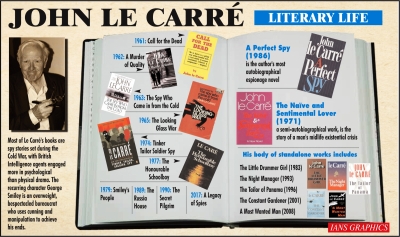By Vikas DattaNew Delhi, Dec 14 : His brief career in espionage ending with the defection of Kim Philby, the Cold War’s most notorious double agent, David Cornwall alias John Le Carre turned to chronicling it instead and within a few books, became a prominent defining voice of the genre, with his gritty accounts of deception, multiple betrayals, and the moral equivalence the profession demands of its less than glamorous practitioners.
Le Carre, 89, whose death after a brief illness was announced on Sunday – shocking his peers and legions of fans – had struck a more realistic chord as his works imbued spy novels with a literary touch.
His over two dozen novels, mostly featuring the dowdy George Smiley, differed with spying’s other popular manifestations such as near contemporary Ian Fleming’s James Bond, focussing more on mind games and psychological gambits, though spells of action and sudden horrific violence are not entirely absent.
But, Le Carre also earned a prominence far beyond his books insofar as he not only popularised spy jargon, especially mole and honey trap, but invented several terms of his own – pavement artists, lamplighters (categories of surveillance teams), babysitters (bodyguards)), legends (spies’ cover stories), Moscow Centre (KGB Hqs) and so on, which went to be adopted by the intelligence fraternity.
Born on October 19, 1931, Le Carre had a troubled childhood, with his mother abandoning him when he was five, and relations with his father, who spent time in jail for fraud, none too good (which he would go to recount in his “The Perfect Spy”) and an indifferent early education in Britain.A year after studying foreign languages in Switzerland, he, in 1950, he joined the Army’s Intelligence Corps in Austria, working as a German language interrogator of people coming from across the Iron Curtain to the West.
In 1952, he returned home to study at Oxford, where he worked secretly for the British domestic intelligence agency, MI5, spying on far-left groups.Following a stint as a teacher, he returned to Oxford to graduate, joined the MI5 in 1958 before transferring to its sister foreign intelligence agency, MI6 in 1960 and worked in Germany.
However, his career – with many others – ended unceremoniously in 1964 when Philby fled to Moscow, and exposed all their covers.
Le Carre had introduced Smiley in “Call for the Dead’ (1961) and “A Murder of Quality” (1962), but these were more of mystery stories with a espionage subtext.
He, however hit the jackpot with “The Spy Who Came in from the Cold” (1963), a deeply distressing tale of effects of espionage machinations on innocents caught up in it.It became a bestseller, and achieved more renown for its creator when it was translated onscreen in 1965 with Richard Burton as the doomed spy.
By then, Le Carre had left espionage to become a full-time writer.Following the dark satire “The Looking Glass War” (1965) , came the trilogy that made his name – “Tinker Tailor Soldier Spy” (1974), “The Honourable Schoolboy” (1977), and “Smiley’s People” (1979), usually called “The Quest for Karla”, after the shadowy Soviet master spy – who Smiley meets for the first time in a Delhi jail!
It also achieved prominence through the TV series with Sir Alec Guinness as Smiley.
Though his next few books also dealt with the Cold War, its offshoots and its aftermath – “The Russia House” (1989) – which also became a famous film with Sean Connery and Michelle Pfeiffer), “The Secret Pilgrim” (1990), “The Little Drummer Girl” (1982), Le Carre moved with the times, dealing with the illicit arms trade with “The Night Manager” (1993), big pharma’s misdeeds with “The Constant Gardener” (2001) and the war on terror with “Absolute Friends” (2004).
And in some cases, he seemed prescient with his works – his manuscript of “Our Game” (1995), about a civil war in the Caucasus, came three months before hostilities broke out again in Chechnya and a few months after “Single & Single” (1999), the scandal involving Citibank laundering money for Russian mobsters came to light.
But, whatever be the milieu, Le Carre never let on a few essential motifs – chiefly being the amorality of the espionage universe, the lasting emotional (and worse) damage it leaves on its practitioners and the sad fate of those who even get tangentially involved in its coils
.






